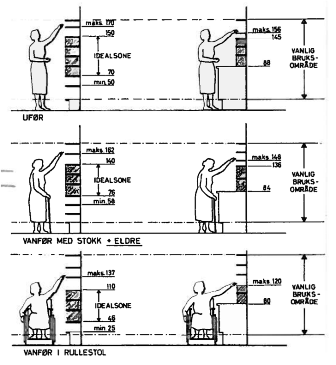Universal design and the difficult definition of "all"
DOI:
https://doi.org/10.7577/formakademisk.436Keywords:
universal design, social democratic housing policy, Carsten Boysen, Byggforsk, TEK 10Abstract
Universal design is “the design of products and environments to be usable by all people, to the greatest extent possible, without the need for adaptation or specialized design”. During the last 15 years this principle has been promoted in Norway as an unequivocal step forward. It may, however, be dangerous to believe that a pure technical solution in itself can bridge political controversies, to reach “universality” (Imrie 2012), and in this paper we unravel important ideological biases that are hidden under the umbrella of universality. Our empirical field is Norwegian housing policy. Within this field we see that some versions of universal design have been advocated for the last 40 years, under various headings, and we see that it has changed from having a social democratic content before it was renamed as “universal design”, to be advocated within a neoliberal paradigm in the last 15 years. Within the social democratic area, the predecessors of “universal design” were advocated as a further development of a housing policy of social justice and economic equity. With the advent of the term “universal design”, the last 15 years, the broad social frame disappeared, but under the cover of “universality” and progress this political change has been silenced.

Downloads
Published
How to Cite
Issue
Section
License
Authors who publish with this journal agree to the following terms:
- Authors retain copyright and grant the journal right of first publication with the work simultaneously licensed under a Creative Commons Attribution 4.0 License that allows others to share the work with an acknowledgement of the work's authorship and initial publication in this journal.
- Authors are able to enter into separate, additional contractual arrangements for the non-exclusive distribution of the journal's published version of the work (e.g., post it to an institutional repository or publish it in a book), with an acknowledgement of its initial publication in this journal.
- Authors are permitted and encouraged to post their work online (e.g., in institutional repositories or on their website) prior to and during the submission process, as it can lead to productive exchanges, as well as earlier and greater citation of published work (See The Effect of Open Access).
- The author(s) must manage their economic reproduction rights to any third party.
- The journal makes no financial or other compensation for submissions, unless a separate agreement regarding this matter has been made with the author(s).
- The journal is obliged to archive the manuscript (including metadata) in its originally published digital form for at least a suitable amount of time in which the manuscript can be accessed via a long-term archive for digital material, such as in the Norwegian universities’ institutional archives within the framework of the NORA partnership.
The material will be published OpenAccess with a Creative Commons 4.0 License which allows anyone to read, share and adapt the content, even commercially under the licence terms:
This work needs to be appropriately attributed/credited, a link must be provided to the CC-BY 4.0 licence, and changes made need to be indicated in a reasonable manner, but not in any way that suggests that the licensor endorses you or your use.



